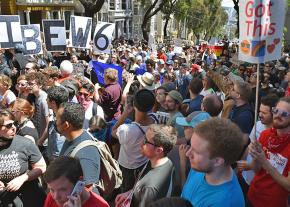Keeping San Francisco free of fascists
San Francisco echoed with messages of solidarity after the fascists who planned to rally were pushed back into the shadows, report members of the ISO's Mission branch.
SOME 15,000 people marched, rallied, danced and protested around San Francisco on August 26 in celebration after a planned far-right rally was canceled one day earlier.
Patriot Prayer, which is based in Portland, Oregon, had been issued a permit to rally by the National Park Service, but it backed out when it became clear that there would be a mass mobilization against their hate-filled event.
The rally, which initially drew support from Kyle "Based Stickman" Chapman and the Oath Keepers, was billed as a "freedom rally." Organizers scheduled the event to take place at Crissy Field on the San Francisco waterfront, which is federal land, where they could show up carrying weapons openly--but the Park Service banned weapons of any kind when it issued the permit.
Weeks before the planned rally, activists around the Bay Area and across the country began organizing to counter the white supremacists' efforts for the final weekend of August. The counterdemonstrations gained steam recently, especially after neo-Nazis in Charlottesville, Virginia, turned the city into a battlefield that exposed the violence of the "alt-right."

Eager to portray himself and his group as victims, Patriot Prayer founder Joey Gibson claims his group has disavowed white supremacy and only wants to "liberate conservatives on the West Coast." He said he canceled the San Francisco rally out of fears that there would be a "huge riot."
But Patriot Prayer is well known for stirring up crowds into violent mobs that attract white supremacists. Jeremy Christian, the white supremacist who killed two men who came to the defense of two young women he was harassing on a Portland, Oregon, commuter train, attended a rally that Gibson organized in April.
Gibson was forced to apologize to those who booked flights and drove hours to attend the canceled rally.
EVEN AFTER the fascists slithered away, thousands upon thousands of people came together to say that the far right has no place in their city.
The San Francisco Labor Council, LBGT groups and other activists organized a protest in the Castro District that ended in a "peace, love and unity" rally at the Civic Center. Organizers estimate that more than 10,000 people converged there for an event that took the form of a dance party for justice.
With less than 24 hours' notice, Gibson and a small band of supporters announced plans for a press conference at San Francisco's Alamo Square Park, prompting an array of left organizations to shift their plans from Crissy Field so they could confront the far right there.
This led Patriot Prayer to retreat even further, calling a last-minute press conference in Pacifica, 15 miles outside the city, and then popping up in random places. Eventually, Gibson and a couple dozen supporters appeared at Crissy Field--only to leave abruptly when they heard counterprotesters were on their way.
Meanwhile, at Alamo Square Park, police engaged in a tense standoff with anti-fascist protesters.
More than 1,000 protesters arrived at Alamo Square to confront Patriot Prayer, mobilized by calls from the International Socialist Organization, Democratic Socialists of America, Party for Socialism and Liberation and Industrial Workers of the World, as well as Bay Resistance, a coalition of left groups and NGOs.
When anti-racists arrived, they found the square completely surrounded by a fence and a one-block perimeter maintained by the cops. At first, police were allowing people to enter the perimeter, but they stopped when they realized enough protesters would be able to push through the fence.
The police then trapped several hundred people inside the perimeter. After a 45-minute standoff, during which protesters took over the intersection of Fell and Steiner, the police finally retreated and allowed a rally to take place at the corner of Alamo Square.
The event quickly became a "victory rally," and speakers spoke of the need to confront the far right wherever they go. The gathering then marched to the Mission District, the heart of activist San Francisco.
GIVEN THAT the far right failed to mount any significant presence, the day's events were an overall success. But the conduct of police and the restrictions on protest imposed by the state show the challenges facing our movement going forward.
At Alamo Square, overwhelming numbers of police confronted counterdemonstrators--despite the fact the park was empty, and there were no right-wingers around.
Furthermore, the planned restrictions at Crissy Field were incredibly stifling. Police planned to set up huge fences and create a no-go zone across a huge area of Crissy Field. They also planned to allow access to the protest through a single entrance and ban almost every object possible. The main point seemed to be to dissuade people from exercising their rights to free speech and assembly.
Even though the far right's Crissy Field protest was ultimately canceled, it seemed like every single San Francisco cop was mobilized to put on a huge display of force across the city.
The left's capacity to mobilize forced the far right to back down, but the city's heavy-handed policing restricted the left's ability to mobilize and organize. The far right isn't going away, but the strengthening of the police will only weaken the left's ability to challenge the right.
Still, despite the confusion of the canceled rallies, our side showed that it has the power to mobilize the numbers necessary to counter an emboldened and dangerous far right.
Even Kyle Chapman conceded the point. "The best game plan moving forward is for us to take a break on rallies in liberal enclaves like Berkeley and San Francisco," Chapman told the East Bay Times. Instead, he said the far right should target conservative cities and "focus on rallies where we have a definite chance of a win."


